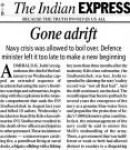There's a hole in the bucket, dear Antony

You don’t say!
Darius Nakhoonwala
Every now and then the tussle between the armed forces and their civilian bosses in every democracy comes to the fore, usually after a disaster involving equipment. India is no exception and the latest episode involving a naval submarine has once again got the leader writers sounding worried and anxious. It is hard to say what actually is the real problem but it is a safe bet to say that corruption and the desire in some to minimise it lies at the bottom of it all.
As to the question of accountability, in 1964, Lal Bahadur Shastri who went on to become Prime Minister, resigned after a train accident. In 1993, Madhavrao Scindia resigned after a plane crash in Delhi. And that is all, as far as the notion of ministerial responsibility goes. A K Antony, as fine a man as you will find, has chosen to sit tight accident after accident and has rendered the Indian Navy a bit of a joke in military circles.
Ignoring the issue of moral responsibility, the Times of India chose to defend the source of the problems: the defence ministry. Giving a long list of recent naval accidents, this is what it said: “Joshi's prompt resignation, owning moral responsibility, is praiseworthy. But 12 mishaps involving conventional submarines and warships in a span of seven months… point to a troubling question: how well is the navy… equipped to maintain its assets during peacetime? …Passing the buck to bureaucrats or political leaders does not hold much water here. It will serve India's defence establishment well not to brush its own failures or lapses under the carpet and thoroughly investigate recent accidents…”
The Indian Express also listed all the bad things that have happened on Admiral D.K. Joshi’s watch and said his “resignation as the chief of the Indian navy…was in the fitness of things. His tenure was overshadowed not only by the navy’s safety record but also the manner in which these incidents were handled…Defence Minister A.K. Antony’s… warning came in late-November, more than three months after the Sindhurakshak, was lost...Joshi responded by claiming the navy’s safety record was “not all that bad”. And the drift continued, unchecked.”
The edit then pointed out that “the mismanagement of the navy could be said to mirror the MoD’s mishandling of the army” only to needlessly bring in its silly troop movement story in January 2012. It then took a swipe at Antony, though for reasons that have nothing to with the Navy but its own story. “His has been a tenure defined by inaction at best and poor judgement in fact.” Ok, right, got it.
The Pioneer as befits a nationalist opposition paper took the opposite view. “In none of these cases could Admiral Joshi be held personally accountable… The same cannot be said of persons operating in the civilian area — and certainly not in politics…Although Admiral Joshi has assumed accountability, he is not the only one that should be doing so.”
The Telegraph had a more dignified take on the affair. “The government’s rapid acceptance of Admiral Joshi’s resignation… show an eagerness that is being perceived as somehow not decorous… The really disturbing aspects are the reports of growing hostility between him and the defence ministry, almost personalized into tension between the Union defence minister and the admiral... The admiral has raised questions about the defence ministry’s failure to replenish a diminishing force… that India’s vessels are overworked…” The edit then asked: “…is the government carrying out its own responsibility to the navy? And, more broadly, has the navy chief’s resignation conveyed any exemplary message to India’s political leaders?” Don’t be naive, man, grow up.
The Hindu lauded the Admiral and pointed out in great detail how “India’s military is, literally, on the verge of breakdown… In recent years, each military chief has told Defence Minister A.K. Antony of the growing danger that India might prove unable to fight future wars…There are more than a few in the armed forces who are asking whether the civilian leadership is not just as responsible for the deaths on board the Sindhuratna as Admiral Joshi… Mr. Antony has done little to address the looming crisis in Indian defence…” The edit then meandered off to unrelated areas.
Isn’t it amazing that everyone had a day and half to do some research on the nuts and bolts of naval spending, threats to our long coastline and India’s response to these threats -- and no one did? Is it any wonder that no one reads edits anymore?
Such articles are only possible because of your support. Help the Hoot. The Hoot is an independent initiative of the Media Foundation and requires funds for independent media monitoring. Please support us. Every rupee helps.